Il reparto degenza per esordi psicotici della Neuro Psichiatria Infantile, grazie all’impegno del Prof. Giovanni Bollea, nel 1967 si trasferisce dalla sede del Policlinico Umberto I di Roma nell’attuale edificio di via dei Sabelli. Alla fine degli anni 70’ il Prof Marco Lombardi Radice concretizza il progetto di un reparto di ricovero per adolescenti con gravi patologie psichiatriche: un luogo che sa accogliere bisogni, esigenze, sogni e desideri, che si trasforma da luogo di cura ad un luogo dove si sperimenta la possibilità di un rapporto con adulti capaci di accettare qualsiasi sfida e di aiutarli nella ristrutturazione dei sé frantumati dalla sofferenza e dalle patologie psichiatriche loro e dei familiari. “Noi dobbiamo starci per aiutarli a rialzarsi, per offrire la possibilità di riscoperta delle emozioni e dei rapporti interpersonali – dice Graziella Bastelli, coordinatrice della NPI– ma permettendo loro di fare le proprie scelte dobbiamo entrare in punta di piedi nelle loro vite. Sono loro una fonte inesauribile di energia, affascinanti e ricchi di curiosità, sanno essere cattivi e giocano sulle nostre debolezze, ma se non permettiamo loro di distruggerci rimangono conquistati da questa diversa esperienza con gli adulti e si lasciano andare iniziando a fidarsi e a liberarsi delle loro paure”. Nel tempo sia le patologie che l’età degli utenti è cambiata: dai 14 anni si è scesi ad 11 anni; le psicosi evidenziano un crescente isolamento sociale, un abbandono totale di ascolto empatico e di offerta pubblica nei territori e nelle scuole; i disturbi del comportamento evidenziano spesso dipendenze da droghe e da alcol; ci sono gravi disturbi ossessivo-compulsivi; molti sono gli episodi di auto aggressività con tentativi di suicidio sempre più a rischio e ricorrenti e l’etero aggressività è sempre più manifesta e senza una capacità del mondo adulto di contenerla; i disturbi alimentari assumono aspetti psicotici; le forme depressive annientano la voglia di vivere ed ogni capacità cognitiva di sviluppo e di crescita; aumentano le problematiche per le adozioni e per i migranti. Nonostante questo aumento di richieste di aiuto, nonostante la gravità delle patologie psichiatriche, nonostante il continuo parlare di diritto a crescere si deve denunciare una riduzione dell’offerta sanitaria pubblica per la prevenzione, la cura e la riabilitazione a causa dei tagli sulla spesa sanitaria operati negli ultimi anni da tutti i governi.
What are the symptoms of happiness?
The Early Psychosis ward of Child NeuroPsychiatry, thanks to the commitment of prof. Giovanni Bollea, was transferred from the Polyclinic Hospital Umberto I of Rome in its present location in via dei Sabelli. At the end of the seventies prof Marco Lombardi Radice realised the project of an inpatient unit for adolescents with extreme psychiatric pathologies: a place that can accommodate the needs, desires and dreams, that can evolve from the therapeutic model to one when the possibility of a relationship with adults able to accept any challenge and to help them in restructuring a Slf broken by pain and by theirs and their own families psychopathologies, is experimented. “We have got to be there to help them get up against offer the possibility of rediscovering their emotions and their interpersonal relationships – says Gabriella Bastelli, coordinator of NPI- while allowing them to make their own choices….we must tiptoe softly ito their lives. They are an inexhaustible source of energy, fascinating and full of curiosity, they can be bad and play on our weaknesses, but if we don’t allow them to destroy us, they are won over by this different experience of adults, and they let go beginning to trust and getting rid of their fears”.Over time both the pathologies and the age of the service users has changed: from 14 down to 11; the psychosis point to a growing social isolations total loss of empathy and of public funding on the territory and in schools; behavioural problem often underline drug and alcohol addictions; there are serious obsessive-compulsive syndromes; many the episodes of self harm and attempted suicide, ever more dangerous and recurring, and the the aggression towards others is more and more open, in absence of the capacity of the adult world to contain it; eating disorders start presenting psychotic connotations; depression takes away the will to live and every cognitive capacity of development and growth; the difficulties are bigger for adoptions and migrants. Notwithstanding the rise in call for help, the seriousness of the psychiatric pathologies and all the talk about the right to full development, the reduction of the public health funding for prevention, cure and rehabilitation must be denounced, because of the cuts implemented over the years by every government.


